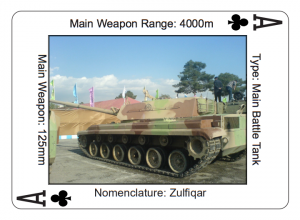In a not very subtle sign of the times, the U.S. Army has produced a deck of playing cards featuring weaponry used or held by Iran in order to familiarize soldiers with Iran’s inventory of weapons and presumably to facilitate their recognition on the battlefield.
The Iran collection follows similar decks of playing cards illustrated with Chinese and Russian weapons.
Another set of U.S. Army playing cards featuring North Korean weapons systems is forthcoming.
The FY2026 National Defense Authorization Act (NDAA) paints a picture of a Congress that is working to both protect and accelerate nuclear modernization programs while simultaneously lacking trust in the Pentagon and the Department of Energy to execute them.
For Impact Fellow John Whitmer, working in public service was natural. “I’ve always been around people who make a living by caring.”
While advanced Chinese language proficiency and cultural familiarity remain irreplaceable skills, they are neither necessary nor sufficient for successful open-source analysis on China’s nuclear forces.
To maximize clean energy deployment, we must address the project development and political barriers that have held us back from smart policymaking and implementation that can withstand political change. Here’s how.
